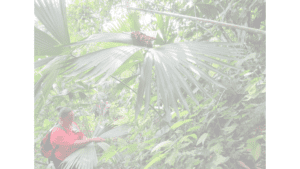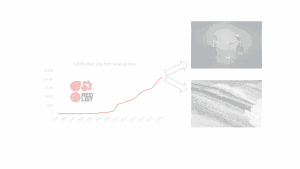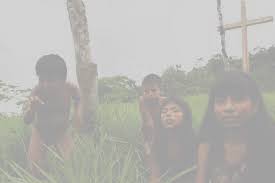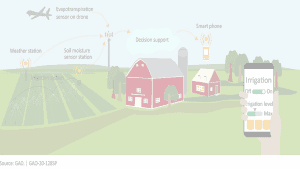In 2019 the word “plastic” is almost as ubiquitous as the material itself is in our lives and environment. In fact “single-use”, another word that frequently refers to plastic products that are only used once and discarded, was Collins Dictionary Word of the Year 2018.As such, this article won’t discuss the global environmental and human health consequences of the plastic production, consumption and pollution, as there exists a plethora of information. Rather it focuses on the Aldabra Clean-Up project that I am part of that is taking place in my small island developing state of Seychelles. However, what can quickly be said about the global plastic problem is that it has a terrible silver lining, one that climate change seems to currently lack. Its impact is so apparent that few to no one chooses to argue against taking meaningful actions to help solving it. As always, there are many debates on what meaningful action looks like, how funds are best spent, and the most effective means to solve the issue. But no one is arguing that the problem doesn’t exist and doesn’t need to be addressed. The value of this truth, considered in the wider field of global environmental politics cannot be underplayed in what is needed for international collective action to solve global environmental issues.
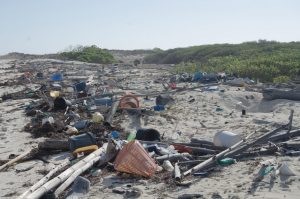
Plastic pollution at the beach.
In Seychelles, a group of 115 islands with an ocean territory the size of South Africa and a population of approximately 94,000, there has been a growing momentum to #beatplasticpollution. Like climate change and overfishing, it is clear to us that plastic pollution poses a major threat to our environment and wellbeing. Accordingly, Seychelles’ civil society, with government support, has been campaigning and educating the public on plastic pollution’s effects, with more recent efforts concentrated on reducing plastic consumption, especially single-use. Results of this campaign includes Seychelles’ ban of plastic bags, cutlery and take away boxes in 2017, and this year’s ban on plastic straws. These efforts, concentrated on consumption change on Seychelles’ inner islands have encouraged actions on the outer islands, which are largely inaccessible and unpopulated, but have large amounts of plastic accumulating.
I work for the Seychelles Islands Foundation (SIF), a public trust that manages and protects Seychelles’ two UNESCO World Heritage Sites, Aldabra Atoll and the Vallée de Mai. As Aldabra’s guardian, SIF has been a unique witness to this pollution and its terrible damage. Although it has continuously tried to mitigate this pollution’s impact through small cleans, the fact that the main sources of this plastic is outside of Seychelles and that its volume is dramatically increasing (as reported by SIF staff based on Aldabra) means it is a global issue that SIF cannot face alone. Add to this the high costs and complicated logistics of operating on a remote island, beach cleaning under scorching sun, trekking over Aldabra’s treacherous terrain, contending with extreme tides and big waves whilst being days away from a hospital has meant that the impact of past cleans have been admirable, but insufficient. Thus, understanding this complexity and the invitation presented by the current global campaign to tackle plastic pollution, it was agreed at SIF’s 2017 Annual General Meeting that in collaboration with the Queens College of the University of Oxford, a meaningful solution would be sought. The Aldabra Clean-Up Project (ACUP) is this solution and was launched in mid-2018 to be a holistic action that would go beyond a five week, logistically challenging clean-up expedition to remove as many tonnes of marine debris from Aldabra as possible.
To accomplish this, ACUP is an international effort that aims to inspire local and global audiences to action. It is also a platform built from the ground up to bring different people together to help solve a complex problem. These people, primarily comprised of a team of six young Seychellois and five Oxford graduate students, were recruited to take on four objectives, which would ensure a genuine impact and complement existing initiatives. I completed the team of 12 as ACUP’s SIF’s co-lead to work with April Burt Oxford’s co-lead, one of the five graduate students. So over the last year this team has worked on fund raising for the expedition that took place in February-March this year, raising awareness throughout the process, conducting research on Aldabra before and during the expedition, and exploring ways to process the collected marine debris after the expedition. Thus as young people, who would not necessarily have conservation backgrounds we did not only intensely clean Aldabra’s beaches to ultimately removed 25.75 of metric tonnes of plastic pollution but also became examples of what is possible as a small committed team.
ACUP’s first objective to raise £150,000 was reached and surpassed in December 2018. Achieving this target was essential for the expedition to take place as its costs exceed SIF’s conventional financial means. These funds, raised through local and international corporate sponsorship, crowdfunding and grants were largely spent on transporting the team to and from Aldabra and moving the collected debris from Aldabra to Mahé, Seychelles’ main island. ACUP’s subsequent objective of raising awareness of the plastic issue on Aldabra, in Seychelles and internationally, highlighting present solutions and alternatives to plastic, bringing attention to existing initiatives in Seychelles and abroad. Accordingly, ACUP organised and participated in video competitions, beach cleans, building and racing rafts made from recycled materials, public film screenings, interactive games, panel discussions as well as national essay and art competitions. During the expedition footage of the clean-up was captured by the volunteers to create a feature documentary and the expedition was also covered by Sky News with live in-field interviews as well as the following short documentary:
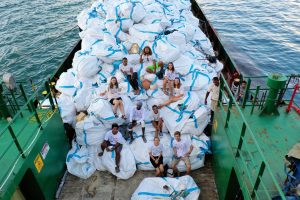
Cleaning team.
ACUP’s third objective, led by April Burt, to conduct research on the composition, origin and effects of the marine debris on Aldabra provides a baseline for future action and research as well as informs Aldabra’s management plan. Beach surveys conducted during the expedition and its total collection effort show that flip flops are the most common item arriving on Aldabra, but that fishing gear makes up over half the weight of the collected plastic pollution.
ACUP’s last objective, the most ambitious and challenging, is the processing of the collected waste to prevent, as much as possible, being landfilled and encourage the concept of the circular economy in Seychelles. To achieve this ACUP must segregate the waste at collection and collaborate with local and international processors, entrepreneurs, artists and, the Seychelles Department of Environment. However, considering Seychelles’ infrastructural limits, that some plastic must be landfilled due its long term exposure to light and salt and that plastic will keep washing ashore, ACUP must be understood as only part of Seychelles’ first steps in a long term solution to marine plastic pollution. As such, we are in discussions with local artists, schools and business as well as international organisations that are interested in creating awareness raising artwork, reusing fishing gear such as buoys and rope, as well as pursuing sustainable businesses that could turn such waste into value added products that would help fund future cleans and research as well as raise awareness.
Accordingly, with a successful expedition, we have been devising ways to upscale ACUP’s impact and consolidate its legacy. At present, discussions include improving the local capacity to sort and process the collected waste as well as increasing the project’s research output by modelling regional ocean currents to better determine the origin of the marine debris. In any case, with the expedition completed and the SIF board of trustees agreeing to second iteration in the near future it is my view that our team of remarkable and tenacious individuals have undertaken a journey that has started a series of actions that will one day restore dignity and respect to a UNESCO world heritage site’s shores and ignite action to change how we treat our planet.
* * *
Post by Jeremy Raguain (@mahesituated), Project Officer from the Seychelles Islands Foundation and the team of the Aldabra Clean-up Project (ACUP, @AldabraCleanUp).
More information:
- Aldabra clean-up project (personal site)
- Aldabra clean-up project (Facebook)
- Aldabra clean-up project (Twitter, @AldabraCleanUp)
- Aldabra clean-up project (Blog)
- Press release, “In another environmental push, Seychelles bans single-use plastic straws”
- Press release, “Beginning of a cleaner Seychelles? Ban on plastic bags, plates, cups now in effect in Seychelles”
- News about plastic pollution, The Guardian
- Press release, “50,000 flip-flops among the 25 tonnes of trash cleand up on Seychelles’ Aldabra Atoll”
- Press release, “Oxford students, Seychellois team up to clean debris from remote island”

